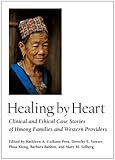|
|
Help |
| Home - Basic H - Hmong Indigenous Peoples (Books) | |
e99 Online Shopping Mall
|
|
Help |
| Home - Basic H - Hmong Indigenous Peoples (Books) | |
| 1-4 of 4 |
click price to see details click image to enlarge click link to go to the store
|
| 1. Hmong of Thailand: Opium People of the Golden Train (Indigenous peoples and development series) by Nic Tapp | |
| Paperback: 72
Pages
(1986-06)
list price: US$6.00 Isbn: 093952127X Canada | United Kingdom | Germany | France | Japan | |
| 2. Healing by Heart: Clinical and Ethical Case Stories of Hmong Families and Western Providers | |
 | Paperback: 368
Pages
(2003-10-01)
list price: US$34.95 -- used & new: US$25.80 (price subject to change: see help) Asin: 0826514316 Average Customer Review: Canada | United Kingdom | Germany | France | Japan |
|
Editorial Review Product Description Customer Reviews (1)
| |
| 3. Hmong: History of a People by Keith Quincy | |
 | Hardcover: 244
Pages
(1997-10)
list price: US$27.50 -- used & new: US$25.00 (price subject to change: see help) Asin: 0910055246 Average Customer Review: Canada | United Kingdom | Germany | France | Japan |
|
Editorial Review Product Description There are slightly more than six million Hmong world-wide. Most Hmong today live in China, Laos, northern Vietnam, Thailand, and Burma and are all believed to be descendants of Hmong who originally migrated from central Siberia. More than eighty thousand have resettled in the U.S. Hmong: History of a People is a detailed rediscovery of their rich heritage, following Hmong history and tradition from their early settlements in China, up to and including much of their contribution to the war in Vietnam. It is a book of struggle prowess, and magic, and reiterates the importance of cultural memory. But the Hmong have a long history of refusing to assimilate into any of the dominant cultures of the region. This has resulted in a nomadic existence throughout Indochina and occasionally, as the gripping first-chapter account of battles between Hmong and Chinese imperial forces reveals, in outright combat. Keith Quincy brings the reader to a closer understanding of why a culture whose people make up less than .01 percent of the world's population would put up such a fierce struggle to preserve their cultural autonomy. Customer Reviews (7)
As for those who are just really interested.. well! This will reveal what most of the population don't know about the hmong; their brief history of where they are originally believed to be from up to their involvement in the vietnam war as to where they are now and some cultural background, too.This is a really awesome book compared to most books written about the hmong people that i've gone through. Highly Recommended.
| |
| 4. Hmong: A Guide to Traditional Lifestyles (Vanishing Cultures of the World) | |
| Paperback: 168
Pages
(1997-01)
list price: US$16.50 Isbn: 9812048030 Canada | United Kingdom | Germany | France | Japan | |
|
Editorial Review Product Description | |
| 1-4 of 4 |